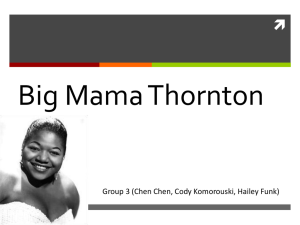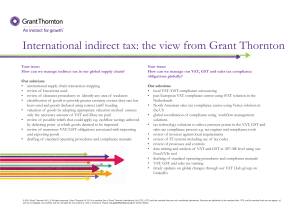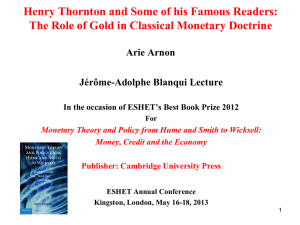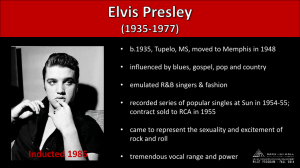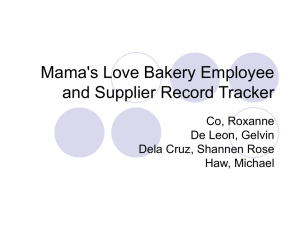Big Mama Thornton
advertisement
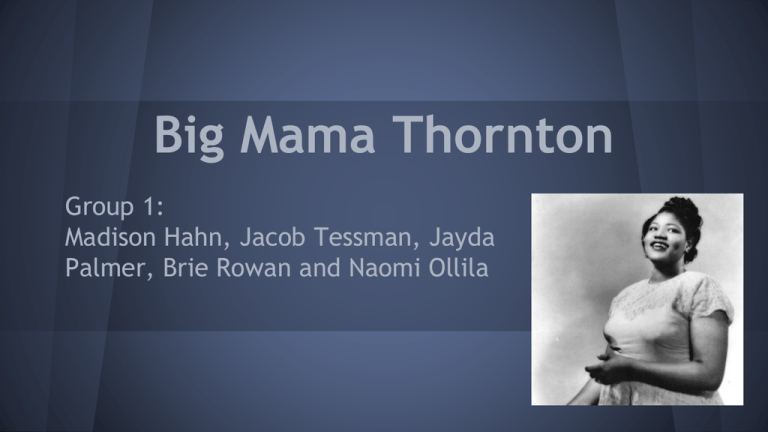
Big Mama Thornton Group 1: Madison Hahn, Jacob Tessman, Jayda Palmer, Brie Rowan and Naomi Ollila Music of the Era ● The Coasters ● The Drifters ● Ruth Brown ● Johnny Otis ● Carl Perkins ● Fats Domino ● B.B. King About Mama Thornton ● Willie Mae Thornton “Big Mama” ● Born on December 11, 1926 in Ariton, AL ● Grew up in Montgomery, AL ● Daughter of a preacher o 6 other siblings Thornton’s Youth ● First began singing at local church o Sang in the choir with mother ● Mother died, began working in a tavern o Meanwhile taught herself drums and harmonica while watching other performers ● When a performer failed to show, she filled the spot ● At 14 won local talent show o Sammy Green was impressed and she signed to tour the South with his “Hot Harlem Review” Musical Influences ● Was influenced early on by the music of her church’s choir ● Also influenced early on by Johnny Otis, a fellow Peacock Records artist Thornton’s Style ● Early on wore feminine gowns ● Once established wore masculine clothing ● Musical style: First started in gospel ● Later moved to R&B Thornton’s Musical Style ● Sang with considerable volume o o o “Didn’t try to sound pretty” Hollers lyrics in a deep, husky voice Had a “tough demeanor” ● Played the harmonica and drums ● Dominates the song with accompaniment from guitar, bass, and drums o This style deviated from typical R&B Musical Style (Continued) ● Her songs typically hold a quick tempo with a quadruple meter in a measure. ● She followed the 12-Bar Blues form for most of her songs. ● Her band consisted of guitar, bass and drums accompanied by hand-clapping, spoon, or tambourine to drive the rhythm. ● Her lyrics were mostly about love songs but not the entirety of her work was about love. Musical Beginnings ● 1948 moved to Houston ● Worked performing in clubs ● 1951 signed with Don Robey of Peacock Records o 5 year contract Thornton’s Rise to Popularity ● Performed in the “Johnny Otis Rhythm and Blues Caravan” o Brought national exposure ● Nickname became “Big Mama Thornton” o Weighed over 300 lbs o Was a very tall woman o And the magnitude of her voice made her sound “big” ● Otis got Jerry Lieber and Mike Stroller to write “Hound Dog” for her Hound Dog ● Top of R&B Charts in 1953 o Would be her only top single recorded ● Paid $500 for the single with no royalties ● 1956 Elvis reproduced the single o Thornton achievement was not as well recognized o Later on she would end her performances with “Bow wow to you too” as a retort. Musical Analysis of Hounddog ● Big Mama Thornton produced the original song “Hound Dog” that inspired a rewrite by Freddie Bell, which then became Elvis Presley’s inspiration for his version of “Hound Dog” ● 12-bar blues form ● Country-influenced blues song ● #1 on the R&B chart for 7 weeks ● Vocals are the most prominent musical role and dominate the song ● Strong, raspy, husky vocals that are loud and intense ● Lyrics that are sexual in nature; would have been considered controversial ● Musical accompaniment featuring guitar, bass, and drums Artists ● ● ● ● ● ● ● ● ● ● that covered “Hound Dog” Jack Turner & his Granger County Gang Billy Starr Eddie Hazelwood Betsy Gay Tommy Duncan and the Miller Bros Cleve Jackson The Dirty Blues Band Etta James Robert Palmer Macy Gray Thornton’s Old Age ● Moved to California 1970’s ● Health drastically declined o Lost a lot of weight and was down to 95 lbs ● Still continued to perform when sick up to 1983 with Muddy Waters and B.B. King ● Died of a heart attack ● 1984 inducted into Blues Hall of Fame Social and Political Importance ● Big Mama Thornton was openly gay, which most people were very critical of during this time. ● Her songs, including “Hound Dog,” were very sexual and open about gender expectations, unlike any other R&B during this time. ● She also helped to bend the rigid gender expectations with her masculine clothing and style. ● She was a voice for outspoken women, in R&B and in general. She was a huge influence for women in R&B. Other artists influenced by Thornton ● Janis Joplin Studied “Big Mama” during musical career o Admired the husky vocal style of Thornton o Modeled her vocals after Thornton’s, never trying to sing in a “pretty voice” o Recorded a cover of Thornton’s “Ball n’ Chain” o Evolution of Rock and Roll ● A strong, confident female singer was a new concept to the era. ● Her fast-paced R&B songs were a bit of an oxymoron. ● She did not have the typical band make up of R&B music. ● Breaking through both racial and sexual barriers for music, this opened up the rock and roll stage for any band to start making music. ● Her confidence of being who she was and being as successful as she was, made way for music to be made by anyone. Bibliography (APA Format) Haworth, Alan L. (2010, June 15). Thornton, Willie Mae [Big Mama]. Retrieved from http://www.tshaonline.org/handbook/online/articles/fthpg Pettis, R., & Summers , C. (2007). Thornton, Willie Mae "Big Mama". Inglbtq: An Encyclopedia of Gay, Lesbian, Bisexual, Transgender, and Queer Culture (). Chicago : glbtq, Inc. Big Mama Thornton Biography. (n.d.). Bio.com. Retrieved June 23, 2014, from http://www.biography.com/people/big-mama-thornton-40355#death-and-legacy& Mahone, M. (n.d.). The Rock and Roll Hall of Fame + Museum. Mama's Voice. Retrieved June 23, 2014, from http://rockhall.com/story-of-rock/features/all-featured/7734_willie-mae-big-mama-thorntonstory-hound-dog/ (2014). The History Channel website. Retrieved June 23, 2014, from http://www.history.com/this-dayin-history/quothound-dogquot-is-recorded-for-the-first-time-by-big-mama-thornton
